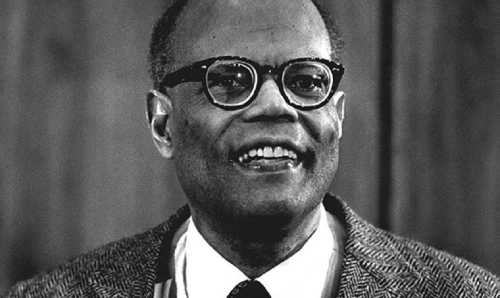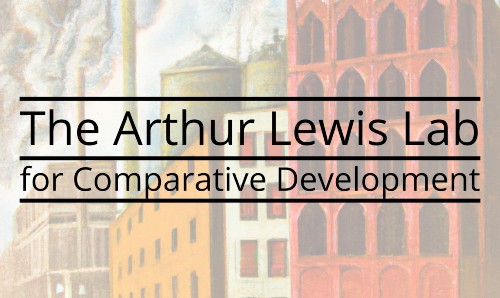
A new interdisciplinary research group in economic history and comparative development at the University of Manchester.

The Lewis Lab seeks to advance cutting-edge research on economic growth, political economy of development, and global inequalities from a long-run historical perspective.
Our aim is to become a leading centre for the study of important questions in these fields, building on the legacy of our association with Sir W. Arthur Lewis, Nobel laureate in Economics, faculty member of the Department of Economics at The University of Manchester between 1947 and 1957.
The founding members of the lab, Nuno Palma and Guillaume Blanc, currently serve as Director and Deputy Director, respectively.
Our people
Leadership
- Nuno Palma - Director, Arthur Lewis Lab and Professor of Economics
- Guillaume Blanc - Deputy Director, Arthur Lewis Lab and Lecturer in Economics
Scientific council
- Robert C. Allen (New York University, Abu Dhabi)
- Timothy Besley (London School of Economics)
- Stephen Broadberry (University of Oxford)
- Gregory Clark (University of Southern Denmark)
- Barry Eichengreen (University of California, Berkeley)
- Oded Galor (Brown University)
- Richard von Glahn (University of California, Los Angeles)
- Bishnupriya Gupta (University of Warwick)
- Saumitra Jha (Stanford University)
- Deirdre N. McCloskey (Cato Institute and University of Illinois Chicago)
- Sheilagh Ogilvie (University of Oxford)
- James A. Robinson (University of Chicago)
- Walter Scheidel (Stanford University)
- John Joseph Wallis (University of Maryland)
- Leonard Wantchekon (Princeton University)
- David N. Weil (Brown University)
Faculty members
- Jubril Animashaun - Fixed-term lecturer
- Guillaume Blanc - Lecturer in Economics
- Catherine Casson - Senior Lecturer in Enterprise
- Georg Christ - Senior Lecturer in Medieval and Early Modern History
- Katsushi Imai - Reader in Economics
- Alessia Isopi - Lecturer in Economics
- Emiel Jerphanion - Lecturer in Finance
- Nuno Palma - Professor of Economics
- Phil Roessner - Professor of Early Modern History
- Edmond Smith - Senior Lecturer in Economic Cultures
- Bart van Ark - Professor of Productivity Studies
- Ákos Valentinyi - Professor of Macroeconomics
- Aashish Velkar - Senior Lecturer in Economic History
- Xiaobing Wang - Senior Lecturer in the Economics of China
- Mazhar Waseem - Reader in Economics
External members
- Cemal Eren Arbatlı - Durham University
- Luz Marina Arias - University of Sheffield
- Soeren Henn - Newcastle University
- Thilo Huning - University of York
- Eric Melander - University of Birmingham
- Andrea Papadia - University of York
- Brian Varian - Newcastle University
- Meng Wu - Manchester Metropolitan University
Hallsworth Visiting Professors
- François Velde (Federal Reserve Bank of Chicago) - Spring 2022
- Richard Von Glahn (University of California, Los Angeles) - Fall 2022
- Peter Murrell (University of Maryland) - Spring 2024
- David de la Croix (Université catholique de Louvain) - Fall 2024
Students and postgraduate researchers
Present
- Mariana Martins Cardoso, Penha Foundation Predoctoral Fellow
- Jordi Caum Julio - Arthur Lewis Lab Postdoctoral Fellow
- Adrian Nicholas Gachet - PhD student
- Alka Raman - Hallsworth Fellow
Past
- Hélder Carvalhal - Marie Curie Fellow, International Institute of Social History, KNAW, Amsterdam
- Meng Wu - British Academy Postdoctoral Fellow (2021-2024). Placement: Assistant Professor, Manchester Metropolitan University
- Carlos Javier Charotti - PhD student (2019-2023). Placement: Senior Researcher in the Research Department of the Central Bank of Paraguay.
Events and working paper series
Seminars
Fall 2024
- TBD
Spring 2025
- TBD
Past
- Lewis Lab Seminars 2023-2024 Alan Fernihough (QUB); Felix Kersting (Humboldt); Romain Wacziarg (UCLA); Pablo Fernández Cebrián (Wageningen); David Chilosi (KCL); Raphael Franck (Hebrew University); Phil Roessner (Manchester); Debin Ma (Oxford); Guilherme Lambais (ICS); Patrick Wallis (LSE); Timur Natkhov (HSE); Neil Cummins (LSE); Adrien Montalbo (Sussex); Nadia Matringe (LSE); Bishnupriya Gupta (Warwick); Mohamed Saleh (LSE); Eric Melander (Birmingham); Lars Boerner (MLU Halle-Wittenberg); François Velde (Chicago FED); Mattia Bertazzini (Notthingham); Pete Maw (Leeds); Leticia Arroyo Abad (CUNY); Peter Murrell (Maryland)
- Lewis Lab Seminars 2022-2023 Brian Varian (Newcastle); Richard von Glahn (UCLA); Luz Marina Arias (Sheffield); Catherine Casson (Manchester); John Wallis (Maryland); Sean Bottomley (Northumbria); Thilo Huning (York); James Robinson (Chicago); Edmond Smith (Manchester); David N. Weil (Brown); André Silva (Nova SBE); Melanie Xue (LSE); Soeren Henn (Newcastle); Eric Chaney (Oxford); Xiaobing Wang (Manchester)
- Job Market Seminars 2022-2023 Jordi Caum Julio (Barcelona); Gianni Marciante (Warwick); Daniela Sola (CEMFI); Peiyuan Li (Colorado Boulder)
Past
The Hajnal Lecture
The Hajnal Lecture
The Hajnal Lecture, held at the Arthur Lewis Lab for Comparative Development at the University of Manchester, celebrates the exceptional work of early- and mid-career scholars who have made significant contributions to the field of economic history. A written version of the lecture will be published in The Manchester School, a renowned journal known for its high-quality research in all fields of economics. This initiative honours the significant contributions of John Hajnal to historical demography and his influential period as a Simon Fellow at our university during the 1950s.
Present and future
TBA
Past
- The Hajnal Lecture 2024 - Prof. Noam Yuchtman (Oxford)
The inaugural lecture, titled "Protests on Campus: The Political Economy of Universities and Social Movements," was delivered on Thursday, May 9, 2024, by Noam Yuchtman, the Drummond Professor of Political Economy at the University of Oxford and All Souls College. Professor Yuchtman's research covers a broad spectrum of topics in political economy and economic history, including the drivers of political ideology and participation in political movements, the impact of educational content in the process of development, the effects of social interactions on economic and political behavior, and the role of the state in promoting economic growth and innovation.
Conferences and lectures
Present and future
- Conference #6 - Economic Development and Structural Change: A Conference in Honour of W. Arthur Lewis - Link to apply - November 14-15, 2024
Keynote speakers: Gerard Roland (Berkeley), Richard Rogerson (Princeton)
Past
- Conference #5 - Legal and institutional origins of economic development - June 18-19, 2024
Keynote speakers: Gary Cox (Stanford), Christine Desan (Harvard), Nuno Garoupa (GMU), Peter Murrell (Maryland)
- Conference #4 - Quantifying the long-run history of Africa - October 27-28, 2023
Keynote speakers: Marlous van Waijenburg (Harvard), Leonard Wantchekon (Princeton), Jacob Weisdorf (Sapienza)
- Lecture #1 - Liberalism caused the great enrichment - June 2023
Speaker: Deirdre N. McCloskey (Cato Institute and UIC)
- Conference #3 - Productivity revolutions: past and future - June 2023
Keynote speakers: Michela Giorcelli (UCLA) and John Van Reenen (LSE and MIT)
- Conference #2 - Big counterfactuals of macro-political history - March 2023
Keynote speakers: James A. Robinson (Chicago) and Walter Scheidel (Stanford)
- Conference #1 - The Chinese economy in the long run - October 2022
Keynote speakers: Stephen Broadberry (Oxford) and Richard von Glahn (UCLA)
Graduate student workshops
Present and future
- Graduate Student Workshop #3 - November 13, 2024 - Apply before September 17
Past
- Graduate Student Workshop #2 - June 17, 2024
Student participants: Bakhtawar Ali (Aix-Marseille), Mohib Ali (Siena), Alice Calder (UNSW), Tommaso D'Amelio (ECARES), Mattias Folkestad (IIES), Nina Liu (KCL), Ryu Matsuura (Northwestern), Matthias Weigand (Harvard)
Faculty participants: Guillaume Blanc (Manchester), Mathias Bühler (LMU), Bjorn Brey (Oxford), Joanne Haddad (ECARES), Sultan Mehmood (NES), Eric Melander (Birmingham) Agustina Paglayan (UCSD), Nuno Palma (Manchester), Henrik Sigstad (BI)
- Graduate Student Workshop #1 - March 2023
Student participants: Joseph Enguehard (ENS Lyon), Adrian Nicholas Gachet (Manchester), Guilherme Berse Rodrigues Lambais (ICS), Jade Ponsard (Aix-Marseille), Carla Salvo (Sapienza), Miriam Venturini (Zurich), Hillary Vipond (LSE), Jinlin Wei (Warwick), Guillermo Woo-Mora (PSE)
Faculty participants: Lydia Assouad (LSE), Guillaume Blanc (Manchester), Dan Bogart (UC Irvine), James Fenske (Warwick), Soeren Henn (Newcastle), Yuzuru Kumon (NHH), Sebastian Ottinger (CERGE-EI), Nuno Palma (Manchester), James Robinson (Chicago
Working papers
- Lewis Lab Working Paper 2024-05 Demographic Transitions, Rural Flight, and Intergenerational Persistence: Evidence From Crowdsourced Genealogies by Guillaume Blanc
- Lewis Lab Working Paper 2024-04 Living Standards in Angloa, 1760-1975 by Hélder Carvalhal and Nuno Palma
- Lewis Lab Working Paper 2024-03 Understanding Money Using Historical Evidence by Adam Brzezinski, Nuno Palma, and François R. Velde
- Lewis Lab Working Paper 2024-02 The Cultural Origins of the Demographic Transition in France by Guillaume Blanc
- Lewis Lab Working Paper 2024-01 French by Guillaume Blanc and Masahiro Kubo
- Lewis Lab Working Paper 2023-01 African Slavery and the Reckoning of Brazil by Guilherme Lambais and Nuno Palma

Visit our YouTube channel to access recordings of our past events, and follow us on Twitter and subscribe to our mailing list and calendar (ical) to keep up to date with our activities.
